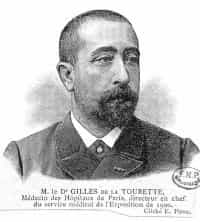Tourette's Syndrome is classified as a rare disease and is a neurological and not a psychiatric pathology, as it was defined until a few years ago, given its symptoms. It is a disease that is often unknown or that not everyone has heard of, but around 220,000 people in Italy are affected, half of whom are children. It takes its name from Gills de la Tourette, a French neurologist who formulated its symptoms starting in the 1800s. This syndrome usually manifests itself around puberty and has a series of very evident and often devastating symptoms such as uncontrollable tics , which occur alternately with states of normality, screaming, hyperactivity , obsessive repetition of the same word and, finally, a propensity to blasphemy and pronouncing vulgar words, it is specifically called coprolalia and copropraxia . More than a pathology, it is a real picture of anomalous behavioral situations that often degenerate into obsessive-compulsive and anxious disorders . In children around the age of 5-10, tics tend to disappear, in the most serious cases, the evident and embarrassing behaviors can range from continuous grimaces, to uncontrollable hand twisting up to the tendency to smell people, poor learning and lack of relational approach . Over the last few years, an ever-increasing number of studies have supported the hypothesis that this syndrome has a strong hereditary character, at least it is possible that there is a certain predisposition, indeed in some studies a mutation has been associated with the appearance of the SDT of the SLKTR1 gene on chromosome 13. However, all these studies have not yet given very convincing answers. No doubt Tourette's Syndrome is caused by damage to the basal ganglia and their connections with the cerebral cortex, therefore the malfunction of these circuits , leads to abnormalities in the release and action of dopamine , which is a neurotransmitter , essentially implicated in motion control. Pharmacological therapy is based on the modulation of the action of the dopamine receptors, in fact haloperidol or pimozide are often used, as well as psychotherapy capable of better managing the tics. Undoubtedly today various therapies and various researches are being studied to try to clarify the origin and cause of Tourette's Syndrome and therefore to improve the living conditions of patients, often set aside by society.
You may also like
Business Phone Subscriptions: Guide to Costs, Options and Benefits
Choosing a business phone subscription can be a complex task, with numerous factors such as costs, benefits, and options to consider. This article explores various business phone subscriptions, examining the best deals and geographic cost variations to help businesses make informed decisions.
Private Mobile Phone Subscriptions: Finding the Best Fit for Your Needs
Selecting a mobile phone subscription can be daunting with myriad plans and hidden costs. This article explores various phone plans for private use, comparing prices and highlighting key considerations to help you choose the best mobile service provider.
Green Energy and Charging Stations: Proposals and Costs
As the world shifts towards greener energy sources, the demand for electric vehicle (EV) charging stations is on the rise. This article examines the current landscape of EV charging infrastructure, comparing proposals, costs, and benefits. We delve into geographic cost variations and spotlight the most competitive charging station offers.
Analysis of Green Energy Through Photovoltaic Panels
As the world searches for sustainable solutions to combat climate change, solar energy emerges as a frontrunner. This article explores the various proposals, costs, and advantages associated with photovoltaic panels, providing a comprehensive guide to understanding and investing in solar power. It also delves into geographical cost variations and compares current market offerings for optimal decision-making.
